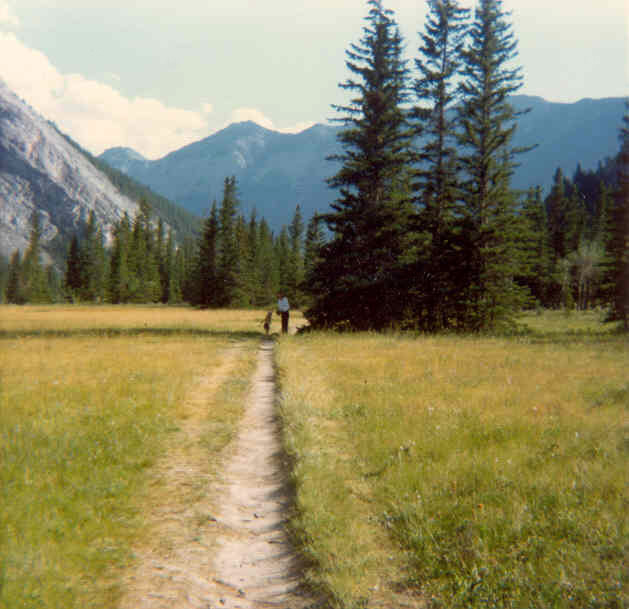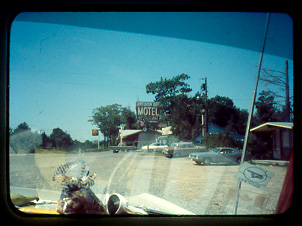This unpublished text is a narrative about the physical and mental journey undertaken by its protagonist, a character by the name of Genjo Danvers. Much of the writing is autobiographical but by making it a fictional construct I have given myself the room to add to the story and to reflect on what happens, particularly the opening up of ideas and intuitions on the part of Genjo as he moves from his closely-knit village community to the world of art, distant mountains and City Lights California.
The preface gives an indication of what follows.
In the summer of 1974 the English artist and writer, Genjo Danvers, travelled to Canada to present exhibitions of his work in Montreal and Vancouver. Taking the long road from east to west Genjo records the changing landscape and the small incidents that happen along the way. From British Columbia he heads south down the west coast to San Francisco, the mythical city of poets and beats, before flying home again to England. The purpose of the journey is partly to gather verbal and visual material for his work and partly to try to make sense of the tangled threads of his life. This book includes an account of his journey with examples of his artworks and texts, and his reflections on the ten years of experiment, study and imagining that brought him to North America.
What you will find here is the residue of a few years of someone’s life. A paper trail of what might have been, rather than an authoritative account of what was. There is no coherence to a life. No abstract pattern that makes the actuality understandable or whole. What is written can be no more than the sweepings from a dusty floor upon which moonlight has shone and starlight has flickered.
As far as I can tell Genjo was about eighteen years old in 1965. What became of him after 1974 is another story.
Here are a few extracts:
From the beginning of Chapter 1:
3rd – 7th July 1974
I’m on a slow train to Leicester. Streaks of mustard in the waving grass. Just three more days to prepare, then it’s waving hands, bye-bye England and a plane to New York. A few clouds pass by, a few sheep, broken arches of a bridge floating in the thick river mud. It’s the 3rd July 1974 and I’m going home to pack. As I head north with a book of Basho on my lap his words hang in the air like the flock of rooks drifting towards the copse on the sun-spattered hillside: ‘Nowhere in this wide universe have we a fixed abode – a party of two wanderers.’ That’s how it will be for Phoebe and I – a party of two wanderers on the road for four months. All the advice we need about travelling unharmed and smiling is in Basho’s Narrow Road to the Deep North and each time I read it I stumble on more nuggets of good sense and casual irony:
I took a kimono off
To feel lighter
Only putting it in the load
On my back.
When I get home to the granite house in Charnwood Forest I look out of my bedroom window at the dark shapes of pines and beeches and I try to fix some scenes of the old place in my head ready to carry them a few thousand miles into another geography – a memento to cheer me up when we’ve had too much of trains and planes. It’s raining now and the last of the light seeps back into the earth. Behind the house the steep slopes rise up to the rocky outcrop that crowns the skyline. Beyond it there’s the deep empty bowl of the quarry where once, when I was a white-faced fearful boy, a desperate man had jumped to escape the hounds that chased him in nightmares that no longer stopped when he opened his eyes. I feel his panic and the tug of wind as his arms become wings and, as the howling turns to silence, I’m never sure which of us will wake. Sleep is never as merciful or as long.
Next day I buy a few things: a small silver torch, two pairs of thick army socks, a toothbrush, notebook and pen. Am I taking too much or too little? What have I forgotten? A newspaper reports on an air crash, a DC10, lost as they say, with everyone on board. I try not to think about such things as I note down a few more addresses of friends and relatives. Postcards are waiting somewhere for me to send. Exotic images beckon, with cryptic messages waiting to be composed. Strange-tasting stamps wait to be licked and pressed. And while they wait somewhere in the future, here the rain pours down, the mountain-ash grows greener and greener, the birdsong cuts through the hissing leaves. I take a walk into the clouds. See the magpie lightning.
And from Chapter 4:
Before I ever came across Dogen’s writings about Buddhism and zazen, I remember feeling the power and effectiveness of sitting without any particular purpose, other than to watch, listen and feel the cool brush of air or the warmth of a granite boulder. Time would seem to stop or to dissolve in a pool of light. Everything seemed infolded into everything else, as if threads of connectedness, infinite in number, shimmered around and through my field of perception. There seemed to be nothing outside or beyond. All was suspended about me and in me. And yet I had no sense of being ‘me’, just the pulse of attention, a mind alive, open to whatever. Sometimes I would note down what had occurred, at other times these fires of attention would flare up as I wrote, sitting out in the garden in Charnwood or at my window looking down towards the docks. It didn’t matter where I was, rundown city centre or frosty mountainside, a door would open to some much bigger mind, that I was a part of. Everything around seemed to glow and there was no substance to things, no separateness.
Furry white moth hangs on to the end of a thick grass blade with its mouth and front legs, falls off, climbs, rests. Starling glides. A nest chirps. How far is it to heaven? Any further than I can see? Any higher than I can reach? A rock-flake shelters a tiny beetle, a prayer shelters a man, no-one comes and goes unnoticed. Sit and watch everything unfold. Everyday revelations are the deepest mysteries. Wood pigeon walks slowly, shadows conceal everything but white patches and a coo.
It was disorientating. I’d be unsure where I ended and the world began. I wondered: who am I? Who are we? What are we?
Are we even the smell of petrol on our fingers?
There was no answer to these adolescent questions, but they kept coming. As did the clearings in the thickets of thought:
A bee enters the mouth of a foxglove, lips shivering wings. Wind touches gravel path, tugs at beeches, strokes the lawn, turns the head of a daisy, enters the beak of a sparrow, curls under the eaves, vibrates around the singing robin and glides over my skin like the breath of the world.
I came across Emerson’s essay, History, where he writes: ‘There is one mind common to all individual men. Every man is an inlet to the same and to all of the same.’ In a short verse at the beginning there’s this gem: ‘There is no great and no small / To the Soul that maketh all: / And where it cometh, all things are; / And it cometh everywhere.’ Although I always stumbled at the word, ‘Soul’, this was a psalm to me, an insistent truth. The language, however archaic it might seem, shook me, snagged against my mind – as gorse and brambles caught against my clothes. Emerson’s words took hold, anchored themselves amongst all the flitting sparks in my head and they hold there still, glimmering down deep like glow-worms in a dark forest.

